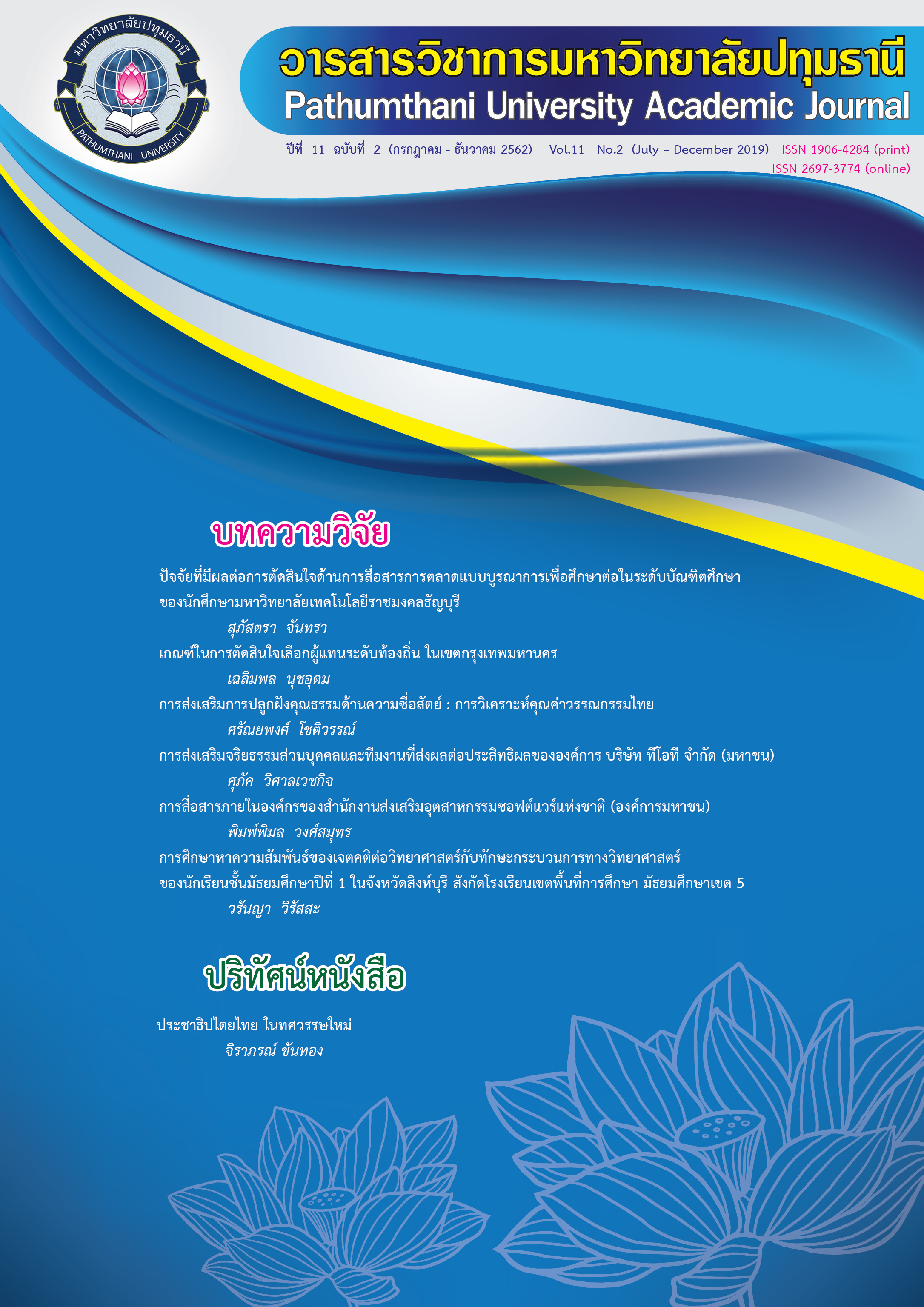Effects of Empowerment Programs on Anxiety Nursing students of Pathumthani University
Keywords:
The Anxiety, The Relationship, The Motivation, The Empowerment ProgramAbstract
The purposes of this quasi experimental research one group pre – post test were to study effects of empowerment programs on anxiety nursing students of pathumthani university. The study samples were purposive sampling consisted of 50 students. Data were collected using the demographic data record form, the anxiety questionnaire, the relationship questionnaire, the motivation questionnaire, and the empowerment program. The content validity index was at .88, the reliability test was conducted using the Cronbach’s alpha which were at .88, .90, and .91. Descriptive statistics and independent t- test were used for data analysis. The results of the study showed that 1) the anxiety before participating in the empowerment were at high level (80%, Mean = 2.65, SD =1.00), and after were at low level (84%, Mean = 1.05, SD =.40), and the anxiety before and after participating the program were statistically significant difference at .05 (t= 3.18, P=.01). 2) The relationship before participating in the empowerment were at medium level (80%, Mean = 2.30, SD. = .39), and after were at high level (92%, Mean = 2.79, SD. = .30), and the relationship before and after participating the program were statistically significant difference at .05 (t= 3.54, P=.01). 3) The motivation before participating in the empowerment were at medium level (60%, Mean = 2.31, SD = .53), and after were at high level (80%, Mean = 2.69, SD =.45), and the anxiety before and after participating the program were statistically significant difference at .05 (t= 2.18, P=.01)
References
2.ธัญญารัตน์ จันทรเสนา. (2555). ความเครียดของนิสิตระดับปริญญาตรี ชั้นปีที่ 1 มหาวิทยาลัยศรีนครินทรวิโรฒ. ปริญญาการศึกษามหาบัณฑิต สาขาวิชาอุดมศึกษา มหาวิทยาลัยศรีนครินทรวิโรฒ.
3.บุญใจ ศรีสถิตย์นรากูร. (2550). ระเบียบการวิจัยทางพยาบาลศาสตร์ (พิมพ์ครั้งที่ 4). กรุงเทพฯ: จุฬาลงกรณ์มหาวิทยาลัย.
4.ประเวศ วะสี. (2544). วิธีคลายเครียด. กรุงเทพฯ: สำนักพิมพ์หมอชาวบ้าน.
5.ศิริวัลห์ วัฒนสินธุ์. (2553). การรับรู้ระดับความเครียดและต้นเหตุความเครียดของนิสิตพยาบาล คณะพยาบาลศาสตร์ มหาวิทยาลัยบูรพา. วารสารคณะพยาบาลศาสตร์ มหาวิทยาลัยบูรพา, 18(1), 47-59.
6.สุธีรา ทันสมัย. (2548). องค์ประกอบที่มีอิทธิพลต่อความวิตกกังวลในการประกอบอาชีพครูของนักศึกษาระดับปริญญาตรีคณะครุศาสตร์ มหาวิทยาลัยราชภัฎวไลยอลงกรณ์ ในพระบรมราชูปถัมภ์จังหวัดปทุมธานี. ปริญญาการศึกษามหาบัณฑิต สาขาวิชาอุดมศึกษา มหาวิทยาลัยศรีนครินทรวิโรฒ.
7.Seaward, B. L. (1999). The nature of stress: college student. Principles and Strategies for Health and
Wellbeing. Toronto: Jone and Bartlett
8.Spielberger, C. D. (1983). Manual for the state- trait anxiety inventory (STAI) Y: Self-evaluation
questionnaire. Polo Alto, CA: Consulting Psychologists.
Downloads
Published
How to Cite
Issue
Section
License
บทความที่ได้รับการตีพิมพ์เป็นลิขสิทธิ์ของวารสารมหาวิทยาลัยปทุมธานี
ข้อความที่ปรากฎในบทความแต่ละเรื่อง เป็นความคิดเห็นส่วนตัวของผู้เขียน กองบรรณาธิการไม่จำเป็นต้องเห็นด้วยเสมอไป และไม่มีส่วนรับผิดชอบใด ๆ ถือเป็นความรับผิดชอบของผู้เขียนแต่เพียงผู้เดียว



